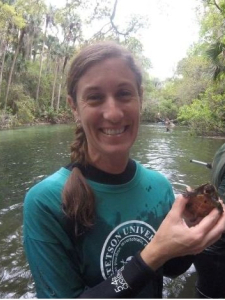Kirsten Work
Professor of Biology
Professor Work has worked on a wide variety of freshwater taxa (bacteria, protozoa, rotifers, zooplankton, dragonflies, snails, and fish) and habitat types (lakes, streams, springs, and wetlands), but much of her most recent work has been studying spring ecology and conservation. View her blog for information on Florida Springs.
- Postdoctoral research associate, South Florida Water Management District and Florida Atlantic University
- PhD, Zoology, University of Oklahoma
- MA, Fisheries, University of Washington
- BS, Biology, University of Wisconsin-Madison

Biography
Kirsten Work's commitment to aquatic ecology and conservation began in the University of Wisconsin's Limnology Laboratory working as a lab tech on fish predation studies. This training led to master's research on sockeye salmon fry predation on zooplankton in SW Alaska and dissertation research on exotic zooplankton in southern Oklahoma, with side projects on cyprinid fishes and freshwater mussels. Finally, before arriving at Stetson, she did postdoctoral work on the carbon dynamics of the Lake Okeechobee food web, including bacteria, protozoa, rotifers and zooplankton. This wide array of experiences has given her a broad perspective geographically and taxonomically. At Stetson, she has worked on spring ecology, often at Volusia Blue Spring, with projects on algae, snails, fish ecology and the effects of invasive snails and fish on ecosystem function. Recently, she has broadened her scope again to evaluate the integrity of springs across Florida and the US and to assess movement of exotic species throughout the Americas. She also has worked on the ecology of local lakes, as central Florida is one of the areas of the country with the highest densities of lakes due to its karst (limestone) geography. In her courses, she regularly collaborates with students on field and lab research projects in which students apply the knowledge they gain in class to real-world problems. These various projects have resulted in publications and attendance at conferences with Stetson students.
More About Kirsten Work
Areas of Expertise
- Freshwater Biology
- Spring Ecology
- Fish
- Freshwater invertebrates
Course Sampling
- Introductory Biology II
- Biostatistics
- Limnology
- Tropical Biodiversity and Conservation
- Senior Research
- Conservation of ecosystems and preservation of species
- The effect of invasive species on freshwater ecosystems
- Ecosystem function, particularly when disturbed
- The effect of landscape connectivity and land use on freshwater biodiversity
- Ray, H.A., Tristano, E.P., and K.A. Work. 2024. Exotic species swapping: reciprocal movement of animal species among regions of the Americas. Neobiota 94: 289-310.
- Work, K. 2023. The distribution, magnitude, and endemic species of US springs. Front. Environ. Sci. 10:1022424.
- Work, K. 2021. The role of emergent physical and chemical properties of Florida spring complexes in predicting fish assemblage structure. Freshwater Science 40(3): 478-493.
- Tanner, B.R., Work, K.A., and J.M. Evans. 2020. The potential of organic sediments in Florida spring runs as records of environmental change. Southeastern Geographer. 60(3): 200-214.
- Work, K. 2020. Not just an arid landscape problem: spring flow declines in a region with high rainfall. Limnologica 82: 125766.
- Gardner, R.C., Okuno, E., Tai, S., Fennessy, M.S., Johnston, C.A., Otte, M.L., Palmer, M., Perry, J.E., Simenstad, C., Tanner, B.R., Tufford, D., Turner, R.E., Work, K., Yaich, S.C., J.B. Zedler. 2019. Advocating for Science: Amici Curiae Brief of Wetland and Water Scientists in Support of the Clean Water Rule. Wetlands
- Work, K. and C.J. Jennings. 2019. Underwater video surveys provide a more complete picture of littoral fish populations than seine samples in clear Florida Springs. Marine and Freshwater Research 70(8) 1178-1184.